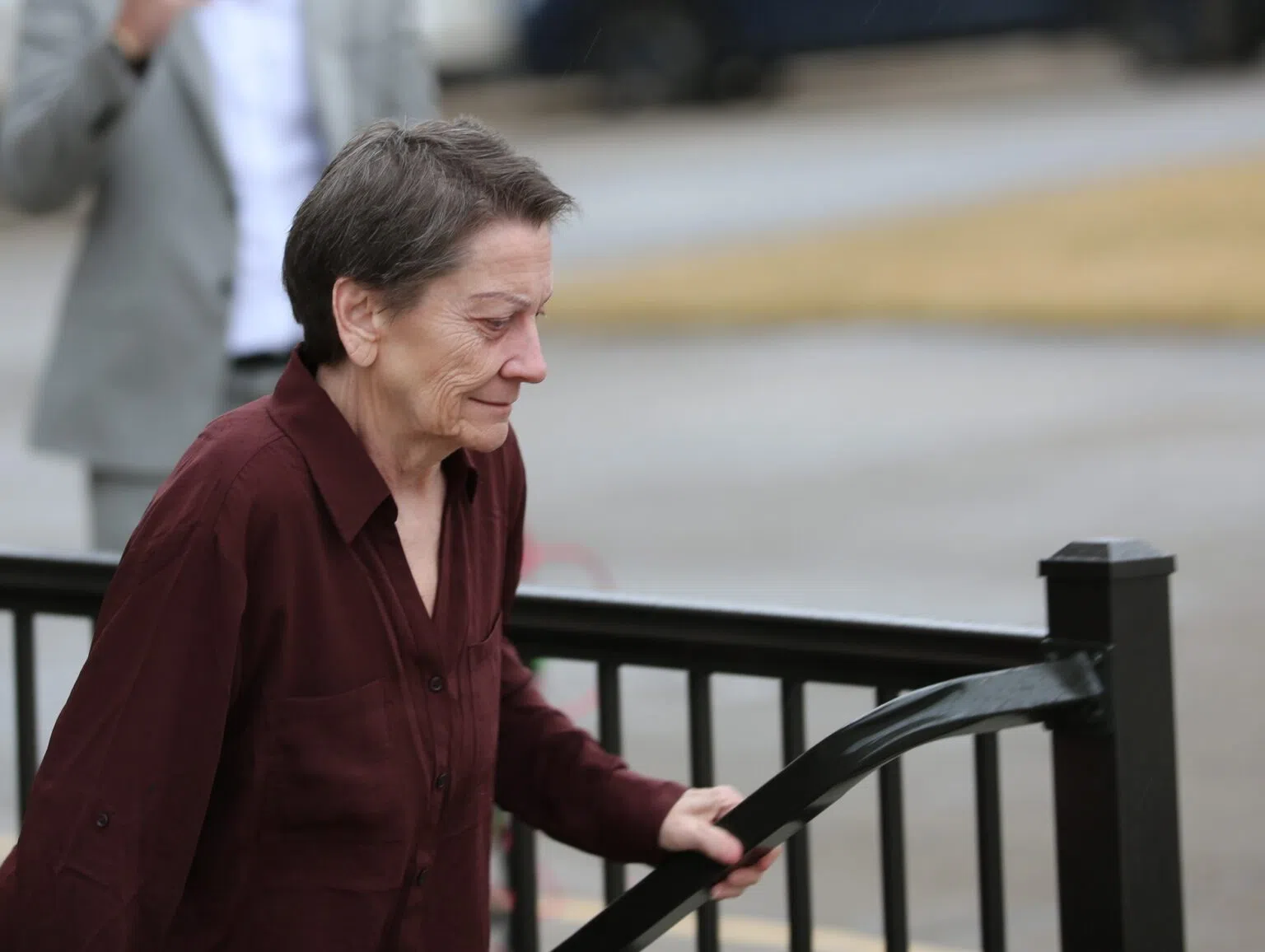
Lonna Carroll walks from the courtroom to a law enforcement vehicle after day one of her trial on April 1, 2025, at the Hughes County Courthouse in Pierre. (Joshua Haiar/South Dakota Searchlight)
By: Joshua Haiar
PIERRE, S.D. (South Dakota Searchlight) — As a trial opened Tuesday for a woman accused of stealing $1.8 million intended for children under South Dakota’s care, the defense alleged that the state shares the blame for crimes that are too old to punish, while the prosecution described a long-running and calculated scheme.
Lonna Carroll, a 68-year-old retiree, is charged with two felony counts of grand theft for crimes she allegedly committed from 2010 to 2023 while working as an administrative assistant for the Division of Child Protection Services in the state Department of Social Services. She faces up to 25 years in prison and a $50,000 fine for the first count, and 15 years in prison and a $30,000 fine for the second count.
The case is part of a rash of criminal allegations against state employees that state Attorney General Marty Jackley has filed since last year, leading not only to criminal prosecutions but also to a series of administrative and legislative reforms adopted in response.
Carroll has been held at the Hughes County Jail since her arrest last summer, because she has not posted bail of $50,000. Her trial is expected to last several days this week at the Hughes County Courthouse.
The alleged crimes
Once a child is placed in state custody, Child Protection Services employees can make financial requests on the child’s behalf for items such as school supplies, clothing or a bed. The funds are deposited into a bank account for the child.
Jackley alleged during opening statements that Carroll made requests, approved the requests, deposited checks at American Bank and Trust in Pierre into children’s accounts, and later withdrew the deposited amounts in cash.
Carroll allegedly did that 215 times, stealing a total of $1,777,665.73 over the course of 13 years.
“It wasn’t by mistake,” Jackley said.
Investigators allegedly discovered a storage unit in Pierre associated with Carroll that had “boxes full of receipts” for expensive clothing.
Carroll was making $21.09 an hour when she retired in March 2023 prior to the discovery of her alleged crimes, and she had since moved to Algona, Iowa. The South Dakota Department of Social Services has an annual budget of $1.8 billion and more than 1,500 full-time positions.
The case begins
Carroll spent much of the first day of trial hunched over with her arms crossed, staring at the floor. The day was consumed mostly by jury selection and opening statements.
Questions to potential jurors from Carroll’s court-appointed attorney, Timothy Whalen, largely centered on concerns about preconceived notions of the case. He also asked potential jurors what a statute of limitations means and whether they accept the notion.
Whalen’s opening statement included a claim that the crimes are too old to prosecute, though he did not delve into specifics.
“They’re time-barred,” Whalen said.
Whalen also said the state needs to take responsibility for its own negligence. He said prosecutors should be required to demonstrate the state was conducting some level of due diligence to prevent the theft from occurring.
“Who was watching the door?” Whalen asked jurors.
Jackley asked potential jurors if they had negative ideas about the state or the criminal justice system. He also asked how they would feel if someone stole a car with the keys left in it.
Jackley told jurors during his opening statement that they will hear audio of Carroll admitting she stole the money during a Division of Criminal Investigation interview.
“You’ll see the whole paper trail process,” Jackley said.
Testimony kicks off
Jackley kicked off the state’s case with testimony from Carrie Watts, the state employee who discovered the financial discrepancies that ultimately led to the investigation and criminal charges.
A court document says Watts discovered the irregularities in 2023 while comparing spreadsheet balances with actual account balances.
“One of the discrepancies was that certain accounts showed significant sums of funds in them on a spreadsheet, but the funds were not actually in the account,” the court document says.
Watts, who left the department last year, described her actions as routine.
“It’s like balancing a checkbook,” Watts said during her testimony.
She said Carroll managed the bank accounts in question.
“They all had Lonna’s name on them,” Watts said.
The defense attempted to use Watts’ testimony as evidence of the state’s negligence, asking why a simple audit took so long to be conducted.
Later, Tonia Bogue, who worked with Carroll, took the stand. She said Child Protection Services has three tiers of approval for payment requests, and Carroll was authorized for all three levels.
Bogue said she had “no idea” how Carroll attained that level of authority.
When asked by Whalen who is tasked with ensuring someone requesting a payment is not the same person approving the payment, Bogue said “I don’t know.”
Two employees with American Bank and Trust also took the stand. The prosecution presented an exhibit showing a nearly $20,000 check was deposited by Carroll into a child’s account on Oct. 6, 2020, and withdrawn by her as cash the next day.
Carroll allegedly kept individual withdrawals under $10,000 to avoid being flagged for fraud.
Aimee Parsons, a bank employee, said she was familiar with Carroll depositing and cashing the checks, but she never reported the behavior.
“Because she was authorized to conduct those transactions,” Parsons said.




Comments